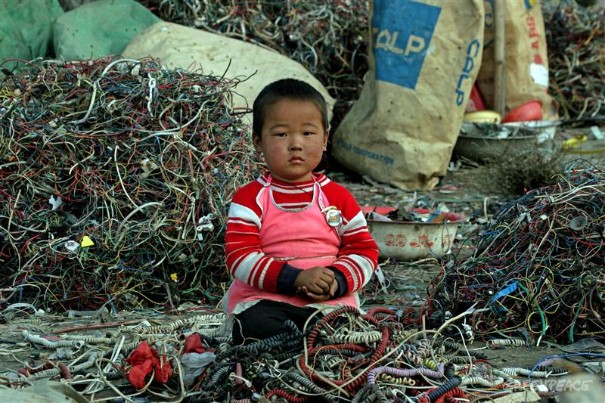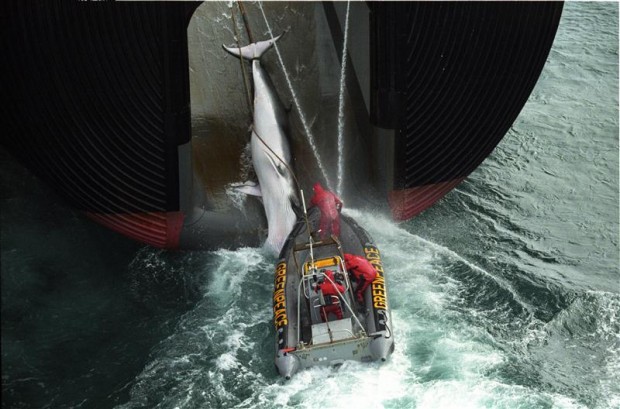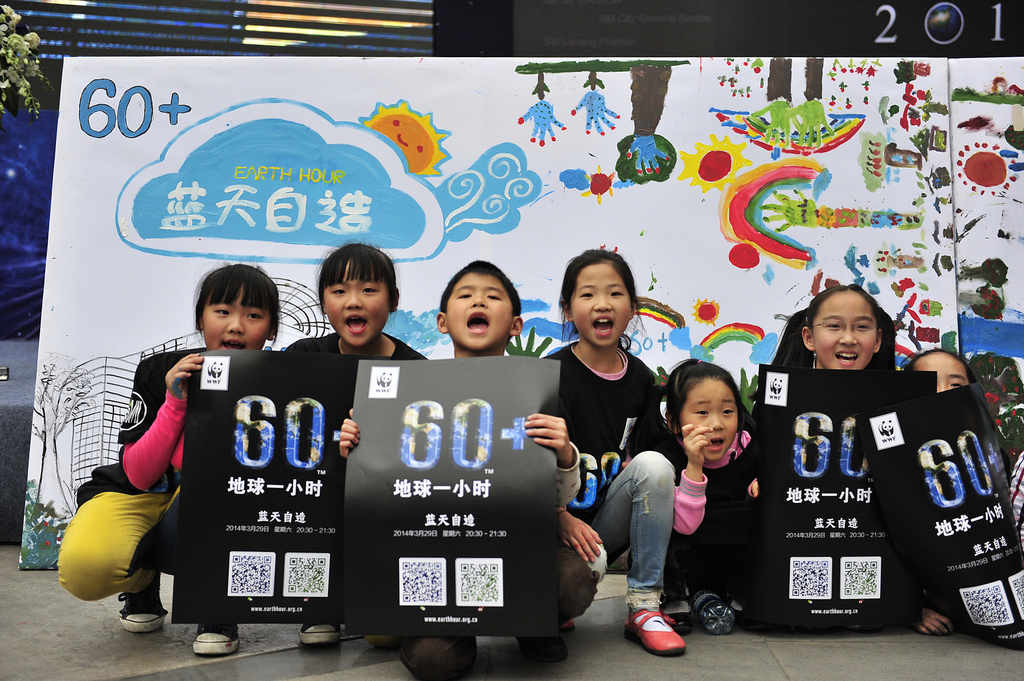This article is part of a series on China and the environment by John Haffner, which was first launched on Carnegie Council's digital magazine, Policy Innovations. After reading this, have a look at all the previous articles in the series, which are displayed at the bottom.
Sze Ping Lo (pronounced "See Ping Low"), CEO of WWF-China, is equal parts activist and intellectual. Now in his early 40s, in a recent conversation Lo looked back on his distinguished 20+ year career as an environmentalist in China and reflected on the experiences and insights that have brought him to his current agenda in the green movement.
Young Activist at the Front
As a left-leaning university student in Hong Kong in the early 1990s, Lo had an epiphany one day when he read the slogan of the Green Party in Germany: "We are neither left nor right, but in front!" Lo saw in the saying a pragmatic way of making decisions for the common good, and he took it on as his personal "compass." The moment of reflection would prove to be the start of a recurring pattern in his career, in which Lo would find himself revising the assumptions underlying his "green thinking."
Lo also had his first experience of activism in college. While participating in an environmental conference for Asian students in Malaysia in 1992, he joined with indigenous people in Sarawak, Malaysia to build roadblocks against Japanese loggers. It was also during this trip that Lo was first exposed to earnest discussions about globalization, multinational corporations, and south-north issues.
As an undergraduate student at the Chinese University of Hong Kong, Lo became even more engaged in environmental issues, including an opportunity to spend a semester studying social theory at the University of Berkeley in 1994 - a place that captured his imagination when he watched the documentary Berkeley in the Sixties. As Lo joked, "I had to go to this mecca of student activism." Though he arrived long after the heyday of Berkeley's counter-culture, he found traces of it. He lived in a student co-op where they provided free meals for those in need once a week. "With discipline and restraint," he reflected, "we can share what we have with the wider community."
From Berkeley to Greenpeace
Fed on Berkeley idealism, in 1999 Lo returned to China to establish Greenpeace there. As he was building Greenpeace's campaign teams in China, Lo wanted to "sound the alarm" on rising air and water pollution - but quickly found that many other stakeholders saw his concern for the environment as premature. When he suggested story ideas to journalists, some of them countered that "We need to lift people out of poverty before we talk about the environment."
But Lo, in contrast, felt that economic growth and environmental impacts should be considered together: "The dark side of the moon comes with the moon." He realized, however, that changing assumptions on environmental issues would be a long-term project. So he focused on building capacity for Greenpeace, trained colleagues, and provided opportunities "for young talent to grow."
In 2001, Greenpeace started a campaign to highlight the fast growing problem of high-tech pollution in China. They focused their efforts on Guiyu in Guangdong province, a city that at the time served as one of the world's largest industrial waste dumps for computers and mobile phones from developed countries and especially the United States. Greenpeace had two demands. First, companies should phase out highly toxic materials. Second, until they were able to do so, they had a responsibility to take their products back rather than dump them. It was a difficult discussion, as it required a huge shift in how producers thought about their "footprint."
 CREDIT: Greenpeace
CREDIT: Greenpeace
In coordination with activists in Silicon Valley, Greenpeace demonstrated how companies were violating the 1992 Basel Convention on the Transboundary Movement of Hazardous Waste. They analyzed the dump site closely, working with medical anthropologists to understand which members of the community were risking their lives. They studied lead levels in the blood of children who lived near the site, and used the data "to make the case for producer responsibility." As international media broke the story, Lo and his colleagues negotiated a new arrangement with Samsung, Lenovo, and others. By 2008, more than half of the global computer and mobile phone market had agreed to Greenpeace's demands.
The campaign was a success partly because Greenpeace was on the same side as China's central government. China was a signatory of the Basel Convention, and when the Chinese government understood that 90 percent of the waste in Guiyu was illegal, it supported their efforts. Greenpeace also launched several other campaigns in China during this period, campaigns related to climate change, forestry, and agriculture. In all these areas, Lo had the same focus, of how to "articulate an environmental discourse in China" that was relevant to its status "as an emerging economy."
By late 2009, Lo felt a sense of accomplishment. When Greenpeace first set up in China, many people wondered whether it would be able to survive. A decade later, it had established itself as a thought leader and could even claim important achievements on e-waste and other campaigns. In addition, Lo had helped cultivate more than 100 young activists, advocates, and environmentalists. Through his work on campaigns and his nurturing of talent, Lo had helped "to expand the space" for environmental NGOs in China.
Something Missing
Yet as proud as Lo was, he also felt that something was missing in the "Greenpeace business model." Greenpeace was good at demanding change, but not so good at "accelerating or mainstreaming change." Already by 2009, many Chinese understood that their country needed a greener economy, but this understanding was not turning into action: "Inertia prevented people from doing the right thing." Lo wanted to understand how China could quickly, economically, and equitably transition to a green future. To answer this question, he sought to broaden his experience by working with a range of Chinese organizations.
First, he worked for the United Nations Environment Programme, completing an expert environmental review of Shanghai Expo in 2010, which gave him insight into the challenges and opportunities facing municipal decision-makers. Next, he worked for a year as secretary general for the Society of Entrepreneurs and Ecology, an experience that helped him understand how leading entrepreneurs thought about environmental issues. He also spent time as executive board chair of Friends of Nature, helping to modernize the grassroots organization, and he started another NGO called Greenovation Hub, which undertook small but impactful projects such as providing communities with safe drinking water. Lastly, he provided "activist education" to various environmental NGOs in China through an organization he called Forward Works (recalling the German Green Party's slogan).
CEO of WWF China
By 2013, Lo had gained a much deeper understanding of the "complicated" picture framing decisions in business and government, as well as a much broader grasp of the environmental community. Building on these insights, he became CEO of WWF China in November 2013. He had come to see that just as China had developed very rapidly, so the nature of environmental advocacy would have to evolve with it: "We didn't foresee that the frame we put on the world would become obsolete so quickly."
The electronic waste issue, he says, is a case in point. True, China is still producing cell phones and computers for the world, and many of these items are returned to China as waste. But China is also now a major consumer in its own right of advanced electronic products, China today has dozens of dump sites like the one he visited in 2001 in Guiyu—and for most of that waste, the finger can only be pointed at domestic consumers. This is a new situation, acknowledges Lo: If we want to reduce the waste we generate ourselves, "the Basel Convention is irrelevant."
Beyond David and Goliath
Lo points to the e-waste example as illustrating a much broader point; that the traditional contrasts underlying environmental activism—of south vs. north, developing vs. developed, and even companies vs. NGOs—are more and more outdated. Or as Lo puts it, sounding very much like an heir to Berkeley philosophers: "The language and aesthetics of protest have become desynchronized from reality."
No metaphor better captures the traditional protest narrative, he says, than the ancient story of David vs. Goliath. The narrative worked well in the beginning: environmentalists "played the role of David," while big polluters—wittingly or not—"were singing the song of Goliath." Admittedly, too, the contrast has understandable appeal, invoking enduring themes of "small vs. big, light vs. darkness, justice vs. injustice." Just think, says Lo, of the classic Greenpeace "iconography" of a small boat trying to stop a giant whaling vessel from harpooning a whale.
 CREDIT: Greenpeace/John Cunningham
CREDIT: Greenpeace/John Cunningham
But this "paradigm" has become outmoded for several reasons. First, in the traditional script, big companies can only play the role of "bad Goliath," even though now more and more companies "want to be green Goliaths." Take Lenovo: while Greenpeace had to pressure them to take action on electronic waste 15 years ago, the company recently approached WWF to work with them on a "massive program" to manage their pollution cycle. Lo is also helping L'Oreal and Coca-Cola figure out how to commit, respectively, to zero carbon net emissions and "almost net zero water uptake." Sure, there is still much room for improvement, but "fewer companies are like Exxon Mobil trying to fool people. Many more want to be good corporate citizens."
Second, there are more Davids now. In the past, environmental NGOs said to communities: "I know how best to fight Goliath, give us your stones." But communities today—especially young people—are much more savvy thanks to social media. As Lo jokes, "Villagers will say: I can stone Goliath myself in my Facebook, or in China, on Wechat." Young people especially want to be directly engaged. Third, since ordinary people also contribute to pollution through consumption of resources and products, "there is a Goliath in every villager." This reality presents an uncomfortable dilemma for many of the largest NGOs, because it amounts to "asking supporters to change the way they live."
Towards a New Understanding, a New Imagination
Drawing these trends together, Lo sees a more complex picture for companies and individuals: both are polluters, and both change agents. And there is a similar need for greater nuance on the country level, where the traditional "north-south divide" must be replaced by a new language and understanding. Here Lo points to the issue of climate change as an illustration of how old grievances may prevent optimal action.
The traditional argument of developing countries is that they have a right to develop as the West has, and since the West has contributed most of the emissions, the burden of responsibility falls to the West. "All true," says Lo. "But on the other hand, this is so 1992, so old school." This traditional complaint, says Lo, prevents us from seeing how "the better way" to provide water, food and energy is through a "green and equitable solution." Sure, there may be bargaining issues in global climate agreements. But the fact remains that China should embark on this path in any case, "because it is good for our country and the long term viability of the economy." The problem, however, is that it is very difficult to make this argument in China or another non-Western country: "When someone tries to say something like this, they are easily dismissed by nationalistic sentiment as speaking for the West."
Where, then, does Lo focus his energies? As he sees it, what is "most crucial" for China today is to deepen the engagement of its citizens: the "overall sense of powerlessness, particularly politically, is a heavy weight on everyone." Ordinary citizens need to see that there are things they can do. So 'Earth Hour' for example, organized by WWF around the world, takes on a greater meaning in China, with almost 200 cities and millions of people involved: "It is so easy, so simple - but it also opens the door to another world." WWF China connects Earth Hour to 'Blue Sky,' a citizen engagement initiative to promote the idea of a national cap on coal consumption at the earliest possible date. In this way pollution, blue skies, and climate change are shown as interrelated: "Until we can burn less coal, we won't have a blue sky and a stable climate." Lo also points to the success in panda conservation efforts as illustrating that there is cause for hope. Thanks to efforts from WWF and many other stakeholders, there are now 1,864 giant pandas in the wild - a 16.5 percent increase from a decade earlier. Says Lo, "When everyone works together, we can turn the tide."
 CREDIT: WWF China
CREDIT: WWF China
Lo also sees broader possibilities. When the Chinese government talks about "ecological civilization," it is signaling that it is open to considering new approaches - a major opportunity for environmentalists and intellectuals, he says. China has a lot to offer in practical terms as well - for instance, with agriculture. While China has become the world's largest producer and consumer of pesticides and fertilizers, its shift to industrial agriculture only began a few decades ago. For thousands of years, agriculture practices in China were de facto organic, and "there are still pockets practicing forms of traditional wisdom." Admittedly, more thinking is needed to make an idea like ecological civilization more concrete. But we should remind ourselves, says Lo, that the political economy of today is a "very recent arrangement," and human beings can undo what human beings have done. Lo sees this evolution towards a new social imaginary as both difficult and necessary, and precisely what characterizes his work at WWF today: "it's not about protecting one more panda, or getting one more company to agree on one more policy—it's about getting people to see possibilities; that we can live in another world on this planet."




